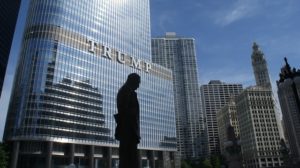Trump Tower Intrigue

There may now be informants in Trump Tower. Most reports of former President Trump’s objections to the National Defense Authorization Act cited his anger about the removal of symbols of the Confederacy and failure to repeal protection for social media companies. But perhaps Mr. Trump should have paid more attention to a provision buried deep within the law that offers big rewards to whistleblowers who reveal money laundering violations.
The Trump Organization has long been plagued by reports of involvement in international money laundering, especially with Russian oligarchs. For example, if an oligarch earned money illegally, he could use the cash proceeds to purchase Trump real estate in the United States. When the oligarch sells the property, he can point to a real estate transaction as the legitimate source of his funds. What was once tainted is now clean. Thus the phrase “money laundering.”
In order to discourage such transactions, Bank Secrecy Act rules require large cash transactions to be reported to government authorities. Moreover, financial institutions are required to file “suspicious transaction reports” when they see movement of funds that appear questionable.
There have long been questions raised about the extent to which the Trump Organization may be involved in such laundering of Russian funds. Time Magazine recently reported that “Testimony to the U.S. Congress … indicates that the Trump Organization’s sales of properties to Russian nationals may have involved money-laundering.” In 2018 House Intelligence Committee members sent a letter to the Justice Department saying that “There have long been credible allegations as to the use of Trump properties to launder money by Russian oligarchs, criminals, and regime cronies.” Another report noted that “By the time he ran for president, Trump had been enmeshed in this mysterious overseas flow of capital—which various investigators believe could have included money launderers from Russia and former Soviet republics who bought up dozens of his condos—for a decade and a half.”
Perhaps these transactions were not designed to conceal dirty money but simply reflected that oligarchs and the Trumps prefer cash. Perhaps all the required forms were filed. But there is evidence to suggest otherwise.
For example, in May 2019 the New York Times reported that DeutscheBank had discouraged its compliance personnel from filing suspicious transaction reports regarding financial dealings of the Trump Organization. Referring to Trump’s “large, all-cash deals,” the Times cited “a pattern of the bank’s executives rejecting valid reports to protect relationships with lucrative clients” like Trump.
If unlawful activity in fact occurred, it may not remain hidden much longer. The new whistleblower law offers money laundering whistleblowers a reward of up to 30% of the government’s recovery. It also offers strong protections against retaliation by the target of the whistleblowing.
The law is modeled on the SEC’s enormously successful whistleblower program. Since that law’s passage in 2010, the SEC has recovered over $2.7 billion based on whistleblower tips, and has paid $562 million in rewards. The number and quality of whistleblower referrals has been skyrocketing, with an increase of 31% in the number of tips since 2018.
If the public reports are true, then employees of the Trump Organization, as well as those with whom the organization does business, may now ask themselves if they should report what they know to law enforcement. The choice could be stark: remain silent and risk possible exposure and even prosecution, or come forward and claim a reward.
Mr. Trump has often complained about those who “spied” on his campaign and famously referred to informants as “rats.” He may soon be searching for spies and rodents in his own basement.
Read More:
- Anti-Money Laundering Whistleblower Program
- Legislation Watch: Proposed Amendments to Bank Secrecy Act Include Whistleblower Rewards
- Project Proposes Legislative Action to Protect and Incentivize AML Whistleblowers
Tagged in: Financial and Investment Fraud, Money Laundering,